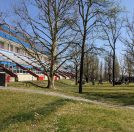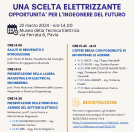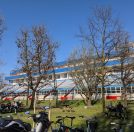Corsi propedeutici alle lauree magistrali: edizione 2021/2022
Per migliorare l’accesso alle lauree magistrali da parte di studenti con una preparazione di base eterogenea sono stati attivati alcuni corsi di didattica integrativa. L’obiettivo è di “rinforzare” le conoscenze di base necessarie per affrontare al meglio corsi di livello avanzato.
- Advanced Mathematical Methods for Engineering
- Essentials of Scientific Computing
- Refresher class for Numerical Methods fo Engeneering Science
- Fundamentals of automatic control
Fundamentals of automatic control
This course, called “Fundamentals of automatic control”, is a good opportunity to align the knowledge of students who received a bachelor from a different university and to refresh the main knowledge of the local student. Even if the focus is posed on the system analysis, some basic elements of control theory and mathematical fundamental will be provided. The firmer will be given as part of the on-line lesson, while the latter are provided as pre-recorded lessons with no student.
Link to the course on Kiro here! (access with your official credentials)
A summary of the main topics is:
- Math fundamental: matrix algebra, complex number, use of semi-logarithmic charts, Fourier series
- System analysis: basic definitions, system taxonomy, equilibrium, stability.
- Continuous-time LTI system analysis: Laplace transform, transfer function, initial and final value theorem, stability criteria, first and second order step response.
- Simulation software: introduction to Matlab and Simulink for control purpose.Control problem: main concepts, block algebra, linear control, bode diagram.
Refresher class for Numerical Methods fo Engeneering Science: a.y.2021/2022
The purpose of this introductory course is to review the fundamentals topics that are needed to profitably attend Numerical Methods fo Engeneering Science. The course is designed for those students who believe they have insufficient knowledge in linear algebra, calculus and coding.
In particular, this class will address the following topics:
– Matlab setup, syntax and implementation of basic algorithms.
– Linear algebra:
1) Matrices and related operations (matrix sum, matrix product,
transposition, determinant, inverse). Matlab implementation of the
previous operations.
2) Linear systems using the matrix notation. Solving a linear system
with Matlab.
3) Eigenvalues and eigenvectors: definition and how to compute them
with Matlab.
– Definition of derivative and basic properties.
– Ordinary Differential Equations: Cauchy problem and how to solve it
using Matlab.
The class is scheduled for September 23 and 24, from 10 am to 1 pm and from 3 pm to 6 pm, room E7.
You can also access to the recorded lessons, see the information at
https://elearning.unipv.it/cou
Advanced Mathematical Methods for Engineering: introduction.
Lo scopo di questo corso propedeutico è quello di introdurre lo studente ad argomenti di base di Analisi Matematica per funzioni in una e piu’ variabili.
Il corso è pensato per quegli studenti che ritengono di avere un bagaglio culturale in Analisi Matematica non sufficiente per seguire il corso di Advanced Mathematical Methods for Engineering o per quegli studenti, che pur avendo già approfondito questi argomenti di base, lo hanno fatto in tempi non recenti e devono quindi rinfrescare questi argomenti alla loro memoria.
Quanti hanno seguito, durante la propria laurea triennale, corsi di Analisi 1,2 e un corso di Metodi possono sfruttare le videolezioni per richiamare alcuni concetti di base, indispensabili per una corretta comprensione degli argomenti trattati nel corso Advanced Mathematical Methods for Engineering.
Il corso consiste in video lezioni disponibili a questo link e esercitazioni in presenza nelle seguenti date:
28 settembre alle ore 11:15 in E6 (2 ore)
30 settembre alle ore 14 in C7 (2 ore)
1 ottobre alle ore 11:15 (2 ore) e alle ore 14 (1 ora)
Esercitazioni aggiuntive verranno stabilite in seguito
Essentials of Scientific Computing
Studenti del 1° anno di Lauree Magistrali iscritti a corsi di forte contenuto computazionale (ad es. Dinamica delle Strutture, Meccanica Computazionale, etc.) ma anche negli insegnamenti di progettazione (ad es. Strutture in c.a., Fondazioni, etc.) possono frequentare “Essentials of Scientific Computing”.





